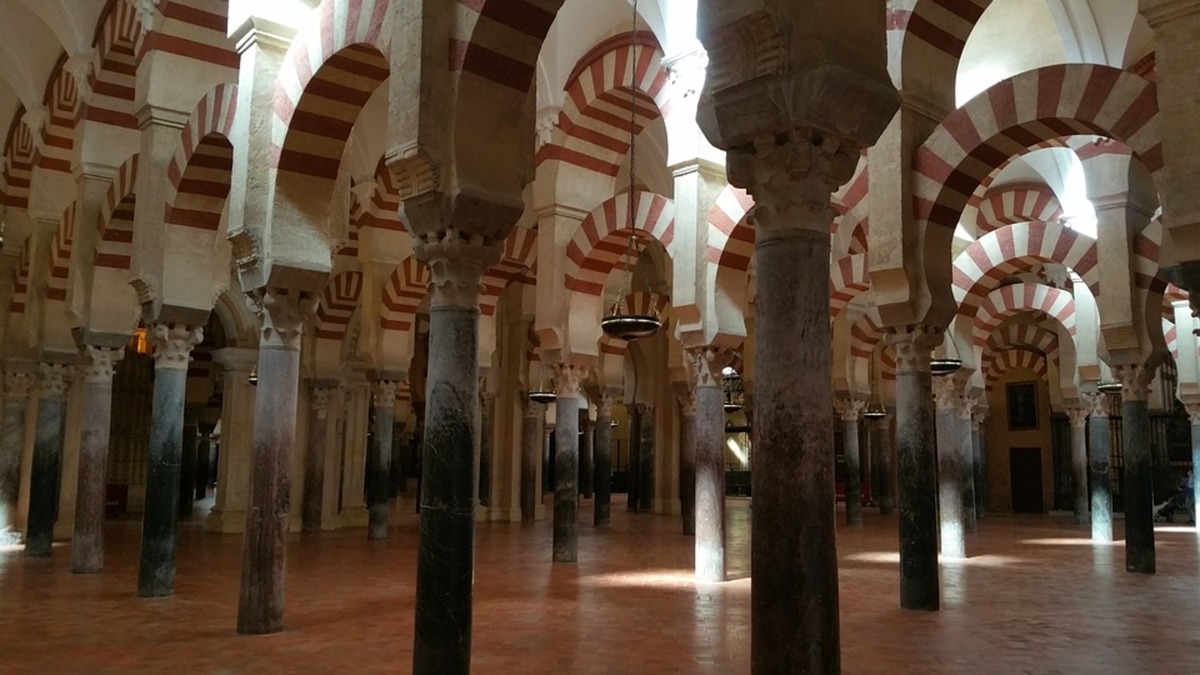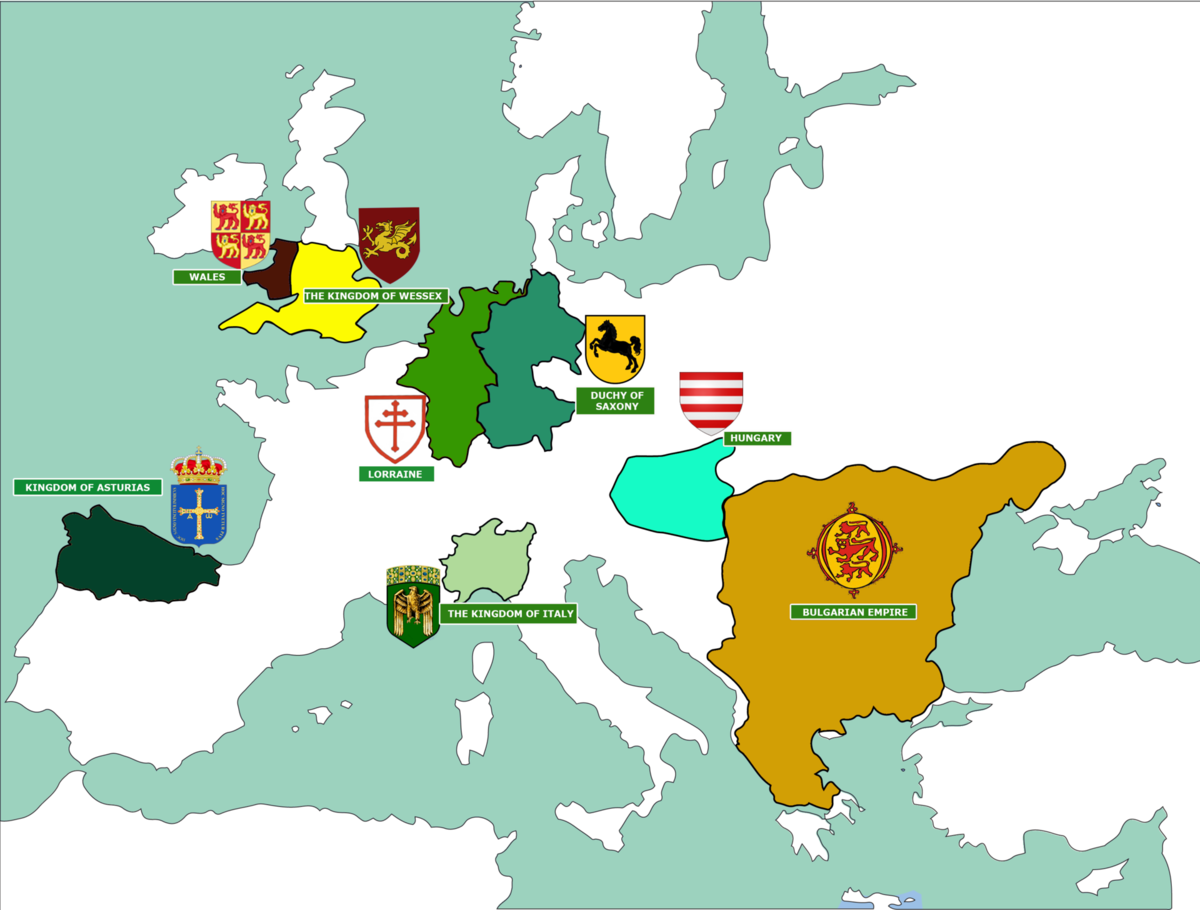The European Championship 920
At the beginning of the 10th century, East and West Francia, whose throne would soon be occupied by a Saxon dynasty, drifted further apart. The king of Wessex on the British Isle undertook a great offensive, and won the lands under Viking control, but he also put the rulers of local kingdoms under his own rule. Separated from the rest of the world, the Umayyad Emirate, based in Cordoba, dominates the Iberian Peninsula and threatens the survival of the remaining Christian lands in the north. The Saracens consolidate their power on the south shores of the Apennine Peninsula. Furthermore, the Hungarian penetration into Pannonia changes the map of Central Europe. In the first half of the 10th century, their cavalry will ride in the direction of Bavaria, as well as the lands in northern Italy, where the domicile elite had constantly lived in a state of war, both local ones between themselves, as well as wars against the kings of Burgundy, to the west of them. In the south-east Europe, the Bulgarian ruler Simeon took control of almost the whole Balkan Peninsula, and as such became a threat to the Byzantine emperor as well.
However, no matter whether it was Simeon’s Bulgaria, the vast state of the prince of Kiev to the east, the huge West and East Francia, the small kingdom of Croatia in the Adriatic hinterlands, the Kingdom of Asturias on the Iberian Peninsula etc., absolutely none of these medieval state entities had possessed clearly defined borders, and even those most powerful did not had a secure dynasty, or a fully established territory. The operating principle here was the influence of a particular ruler on a certain area, which was most prominent in the said ruler’s ability to collect taxes. The question remained of whether his closest neighbor accepts such circumstances,or whether there were permanent border conflicts. The death of a ruler always came as a test of the stability of the state, which means that its borders greatly depended on his character.
The perceived image of one’s destiny that medieval people had, had been, without exemption, a constituent part of the general interpretation given to them by Christian theology and eschatology. Therefore, to a mind contemporary to those times, an understanding of the world without supernatural powers was completely unfathomable. All of life’s phenomena, from a sudden storm or an earthquake, illness, to a successful harvest, or a death of a person, had been defined as the will of God, or the malice of the Devil, as human sin, or as sign od moral decline. The spirit of obsession with salvation and the fear of hell, consumed the medieval person. Christianity, the only allowed religion of medieval European society, had created a spirit of absolute dogmatism, which dissolved the art of compromise, i.e. accepting and absorbing that which is different. On the level of collective mentality, an incredible misapprehension distorted the past, present, and future.This misapprehension is most notable in the insistence on collective responsibility, which is an obvious expression of backwardness. All people alive are collectively responsible for the sin of Adam and Eve, all contemporary Jews are responsible for the Christ’s crucifixion, all the Muslims are responsible for Mohammad’s heresy. The Byzantine world, the Muslim world, as well as China, had surpassed the medieval West in the splendor of their monetary economy, urban civilization, and the manufacture of luxury goods; however, their technological level had also been mediocre at the time. Almost all of the devices used in those times had been described earlier by Hellenist scientists. The weakness of their technical prowess made itself apparent in the prevalence of the tool over the machine, as well as the weak performance of the tool, the lack of agricultural machines, and technical apparatuses which were the cause of low yields, the mediocrity of transportation, together with financial and mercantile professions. Indeed, there is no field of medieval life where another feature of the fear-of-the-new mentality had acted with more anti-progress power than there was in the technical field. To introduce something new had represented, in an even greater manner than before, a monstrosity, a sin. It had meant the exposal of the economic, spiritual, and social balance to danger. If the innovations were of use to the nobility, they would be met with resistance, either passive or active, by the peasant masses.

Sources
- Marc BLOCH, Feudalno društvo, Zagreb, 2001.
- Petr ČORNEJ, Ivana ČORNEJOVA, Ivan RADA, Vratislav VRANIČEK,''Povijest Češke : od seobe Slavena do suvremenog doba'', Zagreb, 2014.
- Jacques LE GOFF, Civilizacija srednjovjekovnog Zapada, Zagreb 1998.
- ''Notes on the Celestine Writings of James Redfield'', (http://hpb.narod.ru/tph/TPH_CWJR.HTM)
- Salmedin MESIHOVIĆ, ''Edicija XII. stoljeća Rimskog svijeta'', (http://www.academia.edu/3615992/XII_stoljeca_rimskog_svijeta)
- Vladimir POSAVEC, ''Povijesni zemljovidi i granice Hrvatske u Tomislavovo doba'', (http://povijest.net/povijesni-zemljovidi-i-granice-hrvatske-u-tomislavovo-doba/)
- Map:
- The Kingdom of Asturias: https://en.wikipedia.org/wiki/Kingdom_of_Asturias#/media/File:Map_Iberian_Peninsula_910-es.svg
- Maps Illustrating the Ruin and Conquest of Britain: http://www.ict.griffith.edu.au/wiseman/DECB/DECBmaps.html
- Hungary: https://ballandalus.wordpress.com/2015/05/15/muslim-and-magyar-raids-in-western-europe-during-the-ninth-and-tenth-centuries/
- Bugarska: https://commons.wikimedia.org/wiki/File:Bulgaria_Simeon_I_(893-927).svg
- Stem duchy: https://en.wikipedia.org/wiki/Stem_duchy
- Lotharingia, https://en.wikipedia.org/wiki/Lotharingia#/media/File:Lotharingia-959.svg
- Photo: https://pixabay.com/en/mosque%E2%80%93cathedral-of-c%C3%B3rdoba-1541600/
